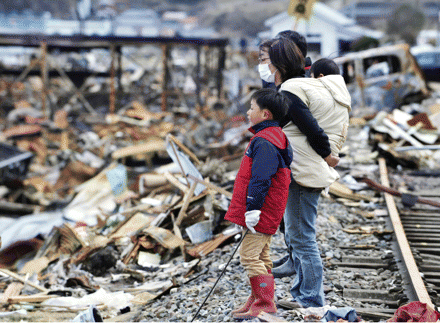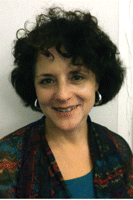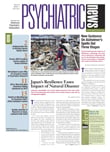The mental health aftermath of the tripartite disaster triggered by the Great East Japan Earthquake (as it is called in that country) on March 11 will be felt for a lifetime, but Japanese psychiatrists and mental health personnel have been taking a series of steps to mitigate the trauma of the events on those touched by them.
As in every mass disaster, the first efforts were devoted to rescuing the living, finding the dead, comforting the survivors, and coming to grips with the unprecedented scale of the disaster. Not only was the earthquake the fourth largest in the world since 1900, but the tsunami it generated wiped whole towns off the map with waves that in some places were 48 feet high. Then came the breakdown in the nuclear power plants at Fukushima Daiichi, followed by leaks of radiation into the air and sea.
At least one APA member lives in the hardest-hit area. Mitsumoto Sato, M.D., of Sendai is retired but volunteered several times at Kodama Hospital in Ishinomaki (north of Sendai) until the lack of gasoline made the trip impossible.
By mid-April, he recalled in an interview, the overwhelming problems there for both healthy evacuees and patients who were being treated before the earthquake were first acute stress disorder and later posttraumatic stress disorder. Many mental health and other medical professionals in the area were living at evacuation centers themselves, said Sato.
"Some psychiatric hospitals were inundated, and inpatients had to be transferred to other psychiatric hospitals," said Yuriko Suzuki, M.D., M.P.H., Ph.D., of the Disaster Mental Health Section in the Department of Adult Mental Health in Japan's National Institute of Mental Health. That phase was carried out within two weeks of the disaster.
Right after the calamity, clinicians saw many individuals with depression, anxiety, and other acute stress reactions.
"These were common presentations, although people did not explicitly express their suffering and emotions, presumably based on the ‘gaman,’ the tendency to withhold their distress within themselves," said Suzuki, speaking as an individual and not as an official representative of the Japanese government or of the Japanese Society of Psychiatry and Neurology (JSPN). ("Gaman" is the Japanese word for a perseverance or endurance in the face of hardship.)
"For those who did not have access to clinics and medication, mental health teams sent by the Ministry of Health from other prefectures sought out patients in shelters in the affected area," she said.
The teams typically included a psychiatrist, a nurse, a psychologist, and psychiatric social workers. They spent a week at a time in the affected areas, trying to make initial contact with those who needed help.
Because people were reticent about their mental health problems, local public health nurses first contacted people in shelters to ask about their health problems in general and then referred those at apparent risk to the mental health team, said Suzuki.
The teams provided clinical service, medications, and psychoeducation, primarily psychological first aid. Guidelines and manuals for mental health teams published by the National Institute of Mental Health and the JSPN were used.
The country's mental health resources will be stretched thin, said another APA member, Linda Semlitz, M.D., who has spent many years living and working in east Asia, and is clinical director of TELL Community Counseling Service, which provides counseling services for English speakers in Tokyo.
Within 36 hours, TELL placed English-language information on its Web site regarding embassy information, train schedule changes, and electrical blackouts. Then they added mental health support information in English, Japanese, and a dozen other languages regarding common reactions after disasters, coping with disruptions to work and personal life, and building resilience.
TELL is working with both the Japanese government and some outside organizations like the International Medical Corps (IMC), a disaster-relief organization that also helps build local medical capacity in 25 countries.
IMC now has offices in Sendai and Tokyo and has been working closely with the National Institute of Mental Health in Tokyo as well as TELL, said Allen Dyer, M.D., Ph.D., a senior health advisor at the organization.
Right after the quake, IMC sent a staff physician to assess the mental health needs in Japan, said Dyer. Much of the outside assistance went less to direct services to victims and more to helping volunteers and other early responders, scaling up training-the-trainer programs, and helping move people out of evacuation centers.
"Our mental health and psychosocial support specialist, a psychologist, has been in Japan since right after the earthquake and is working with TELL to train trainers to work with school teachers and counselors," Dyer told Psychiatric News. He led a team of psychiatrists and psychiatric social workers to Sendai to put on a conference in May at Tohoku Technical University in Sendai covering ways to help communities heal.
The conference included specialists from Bangalore, India, who developed programs in mental health and psychosocial support after the Indian Ocean tsunami in 2004, he said. That work continued in stricken villages for several years afterward.
Every country requires its own approach, however.
"In the U.S. we place a high value on self-reliance," said Dyer. "The Japanese value interdependence, so IMC's role lies in supporting those who take care of those who need care."
Hidden Radiation Danger
Adding to the visible disaster of the earthquake and the tsunami was the invisible threat created by damage to nuclear power plants.
There was continuing uncertainty about the effects of the radiation leaks from the damaged reactors and worry about the long-term consequences in a wide area around the plants, said Semlitz.
Two earlier nuclear disasters may provide at least some guidance for the Japanese as they deal with Fukushima Daiichi.
Psychiatric epidemiologist Evelyn Bromet, Ph.D., studied the psychological responses after the Three-Mile Island nuclear accident in central Pennsylvania in 1979. There, somatic complaints, anxiety, posttraumatic stress, and depression levels remained high among area residents six years later. Among mothers of young children, rates of some disorders were still high a decade after the accident.
And 25 years after the nuclear disaster at Chernobyl, elevated rates of depression and posttraumatic stress disorder were found in the population, wrote Bromet, a professor of psychiatry at Stony Brook University, in a recent paper.
Just as it was at Three-Mile Island, the problem at Fukushima may be not just radioactivity but also the confusing and erratic flow of information from power companies and government authorities.
"People get angry when they are lied to or manipulated by authorities," said Bromet in an interview.
One thing the government could do is provide access to radiation-measurement readings at any time for those who want them, she said. That would provide concrete data for each individual and reassure those who were worried but not seriously exposed.
Research on mental health outcomes of the radiation disaster ought to begin with listening sessions to understand what is on the minds of citizens and to hear the language they use to express distress, said Bromet. A registry should document who has been exposed to which aspects of the disaster to better track the disaster's effects in coming years.
Difficult Challenges Ahead
In any case, the earthquake and tsunami resulted in mental health consequences of such varied type and severity that no uniform psychiatric approaches were applicable in every case, said Hiroo Matsuoka, M.D., Ph.D., a professor of psychiatry at Tohoku University Graduate School of Medicine in Sendai.
"We still confront unpredictable and difficult challenges," said Matsuoka. "Now we must undertake a trial-and-error process to overcome our difficulties."
Clearly, the problems facing Japan are long term.
"The effect of the East Japan Earthquake will not terminate within months. Psychiatric services will be absolutely essential for longer term than the medical services for physical diseases," wrote Masatoshi Takeda, M.D., Ph.D., editor in chief of the Japanese journal Psychiatry and Clinical Neurosciences.
"A long-term program to support those vulnerable people in the affected area should be implemented and kept functioning over the coming years to secure the mental health of the people in the affected area."
(Some reporting and translation for this article were provided by Abraham Levin of Sublingual Services, Tokyo.)


